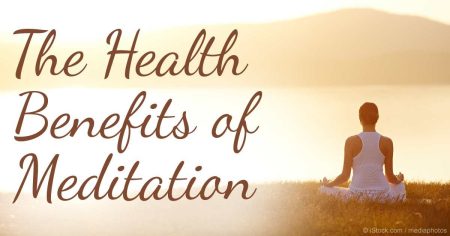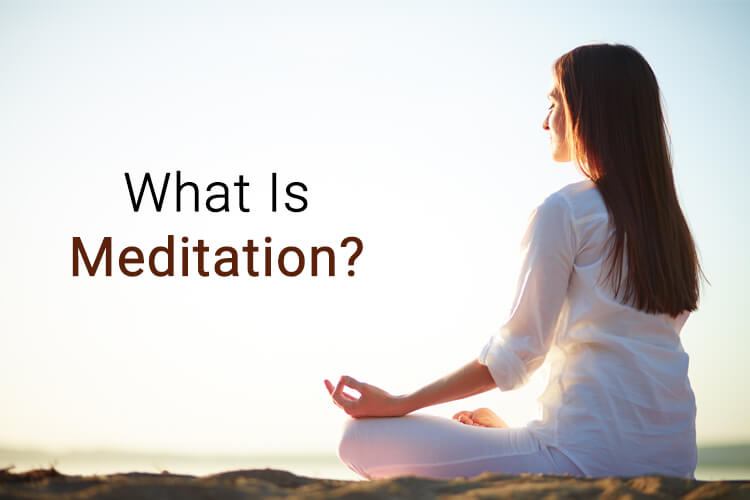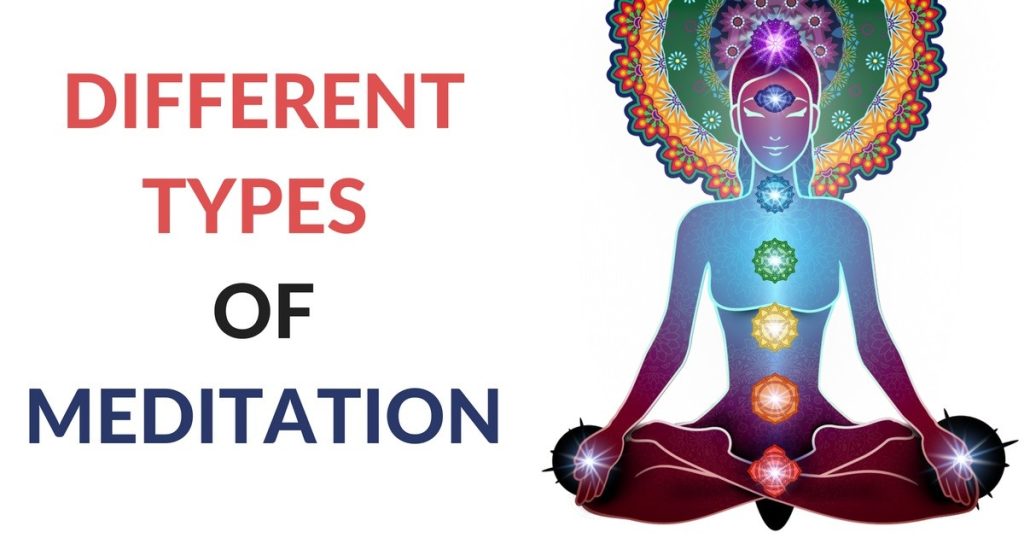

The Benefits of Meditation and How to Do It (Video)
This entry was posted on February 15, 2023.

What Is Meditation?
First, what is meditation? It comes from the Latin word meditari, which means to think, ponder, or contemplate. Meditation is the art of directing focused attention. When we meditate we direct our attention toward specific thoughts, words, or actions.
Although many religions and belief systems incorporate meditation, it doesn’t have to be attached to these practices. An increasing amount of science is showing just how beneficial it can be. For years I thought I was bad at meditating because I couldn’t clear my mind. Turns out, it’s not about that!
Some types of meditation concentrate on images through visualization. Others focus on holding certain feelings, like love, kindness, and forgiveness. Still others direct the attention toward deep breaths, repeated blessings, or rhythmic motion, like walking or running.
Most people have preconceived ideas about what meditation is and isn’t. The great thing is that there’s not just one way to meditate. There are several very different methods, which means there’s something for everyone.
How Meditation Works
According to research, meditation training improves brain structure. A daily practice spanning several weeks can increase the gray matter in your brain. Long-term meditators have higher amounts of gray matter than non-meditators.
What does this mean for your brain health? Meditation may improve your emotional balance, memory, learning capability, and ability to plan and problem-solve. This has far-reaching effects from improving relationships and careers to financial planning, and more.
Meditation can also lower levels of the stress hormone cortisol and increase serotonin. It rivals antidepressant medications in studies. A 2014 systematic review and meta-analysis showed meditation worked just as well as antidepressants.
Even though the improvement was minimal, it was equal to the medications. But without the side effects. While these results came from daily practice over 2 to 6 months, meditation sessions don’t have to be long. Even 10 minutes can improve stress levels, focus, and more.
Health Benefits of Meditation
Science continues to validate this therapy practiced by many cultures and religions for thousands of years. According to the research, regular meditation may help with several health conditions.
Mental Health
Daily meditation is especially beneficial for mental health and emotional balance. Here are just a few ways it can improve your quality of life:
- Combatting food cravings
- Boosting low self-esteem
- Calming elevated stress levels
- Soothing anxiety disorders
- Lowering symptoms of depression
- Improving symptoms of post-traumatic stress disorder (PTSD)
- Increasing self-awareness
Meditation is an all-around beneficial practice. It can help with personal development, improve food choices, lift our mood, and help us adapt under stress.
Physical Health
Meditation isn’t just helpful for your mental health. It can improve digestion, pain levels, sleep, and the risk of serious conditions. Here are some positive physical health effects of meditation:
- Improving symptoms of irritable bowel syndrome (IBS)
- Improving symptoms of fibromyalgia
- Alleviating chronic pain
- Reducing tension headaches
- Lowering resting heart rate
- Reducing high blood pressure
- Lowering the risk of heart disease
- Addressing poor sleep quality
- Improving the immune system
- Supporting overall well-being
Even traditional healthcare is recognizing the benefits. Places like Mayo Clinic recommend meditation for reducing stress. They acknowledge the research showing it to improve both health and quality of life.

Types of Meditation
There are many types of meditation to explore. Some have specific directions and others are based on general guidelines. Here are just a few of them:
Ziva Meditation
Founded by Emily Fletcher, this type of meditation packs a powerful punch. It gives you rest that’s five times deeper than sleep. Ziva focuses on reducing stress and anxiety and improving sleep. The perfect combination for moms especially!
Mindfulness-Based Stress Reduction
Mindfulness meditation is all about staying in the present moment. You focus on the flow of your breath, any thoughts that arise, and how you’re feeling. This type of meditation helps stop the mental chatter and thoughts of to-do lists. It shifts your focus to being rather than doing.
One specific mindfulness-based training is Mindfulness-Based Stress Reduction (MBSR). This meditation program was introduced by Jon Kabat- Zinn and is designed to help reduce suffering in those with chronic pain.
Mindfulness training may help lower disease markers. of disease. A 2021 review of six MBSR studies concluded it may be a beneficial intervention for high blood pressure. A 2011 review of eighteen studies showed it improved symptoms of several chronic conditions. These included both physical conditions and mental health conditions.
MBSR may even help you worry less. Research shows this type of meditation may shrink the part of the brain that causes fear and worry. At the same time, it may strengthen your prefrontal cortex, helping you focus and plan.
Guided Meditation
Guided meditation is also called guided imagery or simply visualization. The “guided” aspect usually comes from listening to a class leader or recording. They guide you through visualizing yourself in a beautiful or relaxing place.
During this type of meditation, the idea is to use as many of your senses as possible. You imagine what you see, hear, smell, or feel. The more you can engage your senses, the better. You may feel the rise in endorphins giving you tingles or goosebumps.
Guided meditation before bedtime may help calm your mind, making it easier to slip into a restful sleep.
Loving-Kindness Meditation
Loving-kindness meditation (LKM) or “Metta” is a traditional Buddhist practice. It focuses on sending out love and positive energy. to the entire world. But it begins with cultivating feelings of love and kindness within yourself. “Love your neighbor as yourself.”
Phrases are included in this practice. You send out prayers or wishes for yourself and others. Examples include:
- “May I be healthy.”
- “May I be confident.”
- “May I be joyful.”
- “May you be healthy and strong.”
- “May you be successful in everything you do.”
As you begin with self-love, it expands outward to family, friends, acquaintances, and even people you don’t like. The intentional feelings of unconditional love then extend to people around the world. Even animals are included in this purposeful loving.
In a 2014 study of those who tested high as self-critical, LKM lowered those feelings over time. This type of meditation was also helpful for post-traumatic stress disorder (PTSD). It helped reduce symptoms and increase self-compassion.
Transcendental Meditation
Transcendental Meditation is a popular meditation technique introduced to the West by an Indian yoga guru in 1959. This practice involves sitting quietly for 20 minutes with eyes closed. Then the meditator repeats a mantra over and over. The technique is practiced twice daily to calm an anxious mind and stressed body.
Over 6 million people have learned transcendental meditation worldwide.
How to Meditate
Meditation of all kinds generally begins with finding a quiet place where you can focus. This can even be outside in nature while you forest-bathe. Walking goes very well with meditation. Just find someplace calming, like a nature path. Then focus on your movement or the sights, sounds, or smells you encounter.
Deep breathing is another easy way to begin meditating. Find a quiet place to sit or lie down. Then simply focus on your breath. If your mind wanders, gently guide your focus back to your breathing. Deeping breathing goes well with a yoga practice.
Mindfulness meditation can be really simple to incorporate into your daily routine. Just direct complete attention to something you’re doing, like brewing tea or shelling peas. Even folding laundry to focus your thoughts. The main thing is to make sure you won’t be interrupted.
You can also use mindfulness to bring awareness to your thought patterns. Dr. Amen calls them “ANTs” or Automatic Negative Thoughts. Once you’re aware of your repetitive thoughts, you can make a deliberate effort to change them. You can then change self-limiting thoughts to empowering ones.
The idea isn’t to necessarily sit in the lotus position and empty our minds. While some people go for that kind of thing, meditation can be very practical.
How I Use Meditation
My meditation practice has certainly changed over the years. I used to easily get bored and my mind would wander. I’d start thinking about new blog post ideas and that load of laundry that needed to be switched to the drier. For a while, I decided I was no good at this meditation thing.
Since I’ve learned more about how to actually do it, I’ve found it to be really beneficial. For me it’s about focusing on my breathing, settling myself, or even just practicing gratitude. It’s something that’s helpful to include in a daily nighttime routine too.
How Kids Can Use Meditation
Children naturally practice meditation when they daydream (visualize) and get lost in their own little worlds. They may get so engrossed in drawing or building a sand castle that they’re completely unaware of the world around them.
That said, kids can also adopt structured meditation with focused attention. Some forms of meditation can help them with attention in school; others assist with getting better sleep. School-based mindfulness programs have become popular over the last several years.
The best meditation techniques for kids seem to focus on mindfulness, breathwork, and visualization. One idea is to have them imagine their favorite place and pay attention to what they see, smell, hear, and feel.
Breathwork combined with a few yoga poses can also help them focus on their bodies and breath. It helps help calm their minds and helps them stay in the present.
These techniques help them bring their attention inward, letting external stresses float away. Then, when they’re feeling scared, overwhelmed, or upset, they have those tools to self-soothe.
Sources
- Schulte, B. (May 2015). Harvard neuroscientist: Meditation not only reduces stress, here’s how it changes your brain. The Washington Post.
- Goyal, M., et al. (2014). Meditation programs for psychological stress and well-being: a systematic review and meta-analysis. JAMA internal medicine, 174(3), 357–368.
- Walton, A. G. (February 9, 2015). 7 Ways Meditation Can Actually Change The Brain. Forbes.
- Hofmann, S. G., Grossman, P., & Hinton, D. E. (2011). Loving-kindness and compassion meditation: potential for psychological interventions. Clinical psychology review, 31(7), 1126–1132.
- Shahar, B., et al. (2015). A wait-list randomized controlled trial of loving-kindness meditation programme for self-criticism. Clinical psychology & psychotherapy, 22(4), 346–356.
- Seppala, E.M., et al. (2014). Loving-kindness meditation: a tool to improve healthcare provider compassion, resilience, and patient care. Journal of Compassionate Health Care 1, 5.
- Tang, YY., Hölzel, B. & Posner, M. (2015). The neuroscience of mindfulness meditation. Nature Review Neuroscience, 16, 213–225.
- Mayo Clinic Staff (April 29, 2022). Meditation: A simple, fast way to reduce stress. Mayo Clinic website.
- Janssen, M., et al. (2018). Effects of Mindfulness-Based Stress Reduction on employees’ mental health: A systematic review. PloS one, 13(1), e0191332.
- Taren, A. A., Creswell, J. D., & Gianaros, P. J. (2013).Dispositional Mindfulness Co-Varies with Smaller Amygdala and Caudate Volumes in Community Adults. PLOS ONE, 8(5), e64574.
- Conversano, C., et al. (2021). Is Mindfulness-Based Stress Reduction Effective for People with Hypertension? A Systematic Review and Meta-Analysis of 30 Years of Evidence. International journal of environmental research and public health, 18(6), 2882.
- Niazi, A. K., & Niazi, S. K. (2011). Mindfulness-based stress reduction: a non-pharmacological approach for chronic illnesses. North American journal of medical sciences, 3(1), 20–23.
- Kearney, D. J., et al. (2013). Loving-kindness meditation for posttraumatic stress disorder: a pilot study. Journal of traumatic stress, 26(4), 426–434.
- Gryczynski, J., et al. (2018). Integration of Transcendental Meditation® (TM) into alcohol use disorder (AUD) treatment. Journal of substance abuse treatment, 87, 23–30.
- Krishnakumar, D., et al. (2015). Meditation and Yoga can Modulate Brain Mechanisms that affect Behavior and Anxiety-A Modern Scientific Perspective. Ancient science, 2(1), 13–19.
The Health Cure has more than 13 years of experience in the field of health, various plant medicines and lifestyle.
Already able to help tens of thousands of people all over the world with plant medicines such as Graviola, Kava, Cannabis THC/CBD oil and other Cannabinoids and various holistic therapeutic treatments. At the health centre, The Health Cure runs courses in lifestyle, education in mindfulness. Also for different retreats. Contact The Health Cure for information.
Tags; The Health Cure, The Health Cure Netherlands, The Health Cure UK, The Health Cure France, RSO Oil, Medicinal Cannabis, Rick Simpson, Run From The Cure, Cancer Cure, Cancer Cells, Cannabis, Marijuana, Dr. Cristina Sanchez, Cannabis oil, Forbidden Cure, Medicine, Cure all, Cannabinoids, CBD, Cannabidiol, Parkinson, Multiple Sclerosis, Seizures, Documentary, Testimonials, THC Oil Cures Cancer, Parkinsons, Tremors, Cannabis Oil Cures Cancer, Hemp Oil Cures Cancer, Endocannabinoids, Medical Cannabis, CBG, Skin cancer, Hemp-cream, THC Cream, healing paths, clinical healing, hypnosis and regression, The Health Cure since 2009, Ayahuasca Medicine, DMT, Shaman, Nature, Grounding, Earthing, www.thehealthcure.org, Dogs, Cats, Horses, All Pets, Endo cannabinoids System, Alzheimer, phoenix-tears, Liver Cancer Stage 4, Breast Cancer, Energy, Qi Gong, shaman, Sage, shamanic healing, Ayahuasca, Healing Plants, Grounding, MMS, Jim Humble, Miracle Mineral Supplement, Rewired, Dr. Joe Dispenza, Gaia, Series, micro-dosing psilocybin, Mindfulness, Sleep, Plant medicine, Paleo Lifestyle, Qigong, Chinese Healing, Shamanism, Yoga, Yogic Path, Spiritual, Love, Ancient Knowledge, Pain, Healthy Lifestyle, Nutrition, Monsanto, Documentary, Superfood, Healthy Foods, Lifestyle,
Parkinson's, Placebo, Nervous System, Mind Body Healing, Quantum Leap, Nature Of Reality, Mind Body Healing, Subconscious Mind, Energy Healing, Life-force, Wellbeing, Love, Peace, Joy, Alive, Gaia, Ickonic, Bruce Lipton, Deepak Chopra, Dr. Joe Dispenza, Gregg Braden, Randy Veitenheimer, Dr. Wayne Dyer, Eckhart Tolle, Marcel Messing, Sound of Creation, Geometry, Frequency, Medical Intuition, Sacred Power, Secrets Of Sleep, Awake, Insomnia, Narcolepsy, Retreats, Retreat, Reiki, Quantum Touch, Meditation, Affirmations, Energy & Vibration, Balance, Abundance, Change Your Thoughts, Change Your Life , Gratitude, Letting Go, Subconscious Mind, Chakras, Energy Wheels, Acsension
